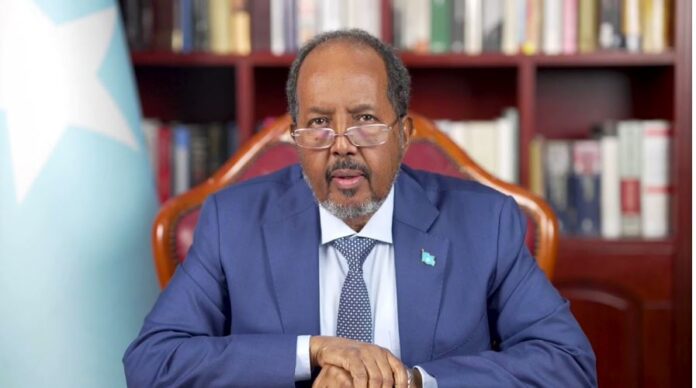The Somali government is facing immense pressure to achieve full sovereignty for the country, enabling it to successfully exit Chapter 8 of the UN Security Council charter.
Following a 12-year period of unsuccessful peace and state-building efforts, the UN Security Council has called upon the Federal Government of Somalia to achieve “sovereign capabilities” within one year.
This is necessary to graduate from the impositions of Chapter VII and Chapter VIII of the UN Charter, bring an end to the African Union Mission in Somalia by the end of December 2024, lift the arms embargo, and meet the aspirations of the Somali people for a secure, stable, peaceful, united, democratic, and prosperous Somalia that can independently sustain itself. What are chapter 7 and 8 In the UN Charter?
Chapter 7 of the United Nations Charter:
This chaper deals with the authorization of the use of force by the UN Security Council in maintaining peace and security. It provides the legal framework for the Security Council to take collective action, including the imposition of sanctions or the use of military force, to address threats to international peace and security. It consists of two main provisions:
- Article 39: This article states that the Security Council shall determine whether a situation constitutes a threat to peace, a breach of the peace, or an act of aggression. It empowers the Council to make decisions regarding the existence and nature of such threats.
- Article 42: This article authorizes the Security Council to take “action by air, sea, or land forces as may be necessary to maintain or restore international peace and security.” It gives the Council the authority to use military force as a last resort.
The application of Chapter 7 has been used in several countries, including:
- Iraq-Kuwait Conflict (1990-1991): The Security Council authorized the use of force against Iraq after its invasion of Kuwait. This led to the Gulf War, in which a coalition of countries was formed to drive Iraq out of Kuwait.
- Yugoslav Wars (1992-1995): The Security Council established a series of resolutions relating to the conflicts in the former Yugoslavia. Military actions, such as the establishment of no-fly zones and the authorization of peacekeeping forces, were undertaken.
- Libya (2011): The Security Council authorized military intervention in Libya to protect civilians during the uprising against the regime of Muammar Gaddafi. This led to the enforcement of a no-fly zone and the eventual ousting of Gaddafi.
Chapter 8 of the UN Charter:
This chapter focuses on regional arrangements and organizations that contribute to the maintenance of peace and security. It acknowledges the importance of regional efforts and encourages the peaceful settlement of disputes through regional arrangements, subject to the authority of the Security Council.
Under Chapter 8, regional arrangements can have a role in conflict prevention, peacekeeping, and peacebuilding. This chapter recognizes the potential of regional organizations to address regional conflicts effectively.
Examples of regional arrangements and organizations that have been applied under Chapter 8 include:
- African Union (AU): The AU has played an active role in conflict prevention and resolution on the African continent. The AU has deployed peacekeeping missions, such as the African Union Mission in Somalia (AMISOM) and the African Union-United Nations Hybrid Operation in Darfur (UNAMID).
- European Union (EU): The EU has taken various actions to address conflicts in Europe. It has contributed troops to peacekeeping missions, such as the European Union Force in Bosnia and Herzegovina (EUFOR Althea). The EU has also played a role in conflict mediation, such as in the negotiations for the Dayton Peace Agreement that ended the Bosnian War.
- Organization of American States (OAS): The OAS has been involved in conflict resolution and peacekeeping efforts in the Americas. It has conducted election monitoring, facilitated diplomatic negotiations, and coordinated peace missions in countries like Colombia and Haiti.
These are just a few examples of regional arrangements and organizations that have utilized Chapter 8 of the UN Charter to address regional conflicts and contribute to international peace and security. The specific application and effectiveness of these arrangements can vary depending on the context and the cooperation of member states.
However, when it comes to Somalia, there are certain aspects that have been disregarded in terms of attaining sovereign capabilities. These include the dedication to national unity, the adherence to the rule of law, the finalization of the provisional constitution, and the enhancement of public trust in the government by making just administrative decisions that are both lawful and reasonable, and are conducted in a fair manner.
The steps required to achieve sovereign capabilities are outlined in:
- – The completion of the Provisional Federal Constitution.
- – The approval of the federal government’s program by the federal parliament.
- – The adherence to the directives outlined in the Resolutions and Presidential Statements of the UNSC.
- – The implementation of the economic management program to support the Debt Relief Initiative (HIPC).
- – The execution of Somalia’s Transition Plan (STP) for the departure of African Union peace and security Forces after their 16-year presence in Somalia.
- – The resolution of the status of the North West Regions (Somaliland) within the Federal Republic of Somalia (FRS).
- – The establishment of the National Security Architecture.
- – The implementation of the Justice and Correction reform plan.
- – The adherence to the Guidelines for the preparation of a credible free and fair one vote one person election system.
Can the president pass the hurdles?
In order for Somalia to establish itself on the global stage, it must achieve the aforementioned objectives.
President Hassan Shiekh Mohamoud, despite facing numerous challenges in governing the country, is taking the lead and working within a tight timeframe.
It is crucial for all Somalis to unite and set aside personal interests to bring stability and resolve clan disputes in the country.
By doing so, Somalia can regain its full sovereignty that has been compromised. Though President Hassan may not have a capable team supporting him, his determination to achieve sovereignty remains steadfast.
The ultimate outcome of his efforts will only be known in due course if the president manages to cross this hazardous junction.
The end
Mohamed Mohamud Adde
An academic and Political Analyst


